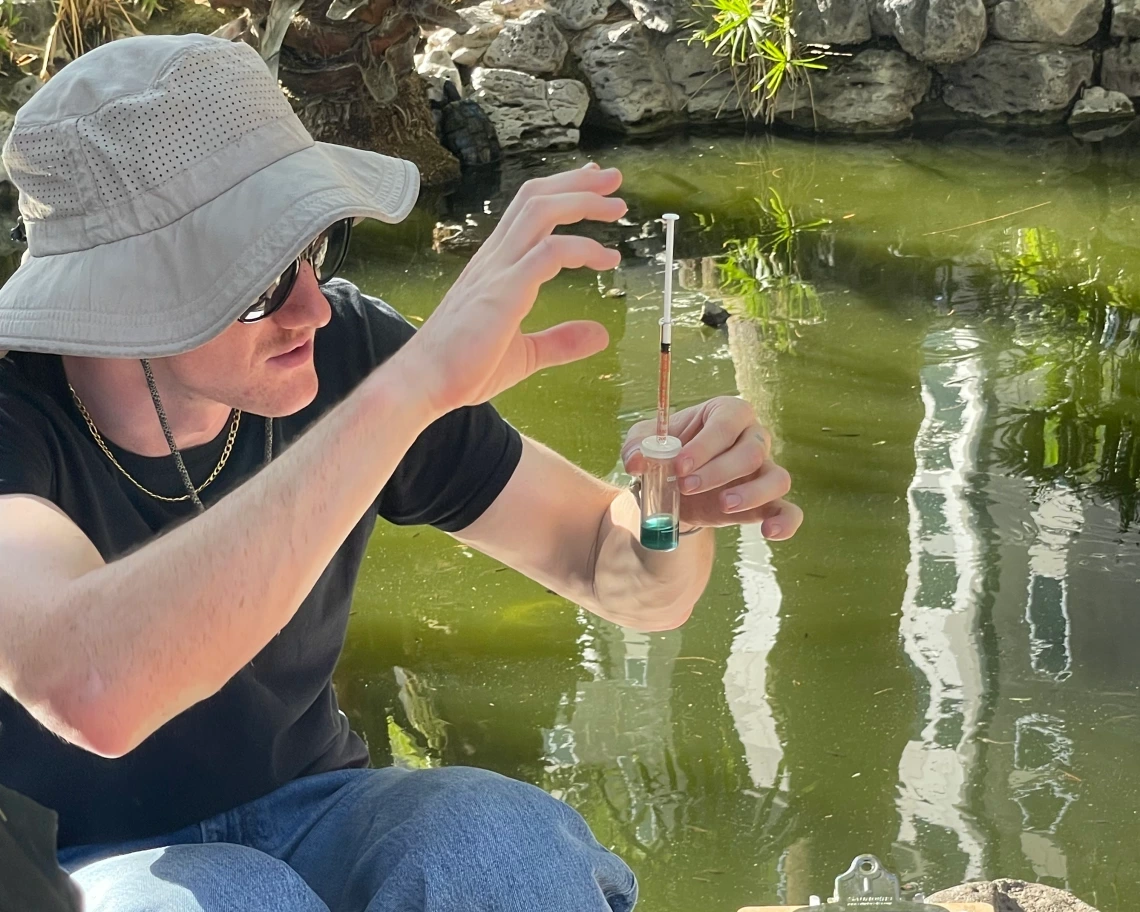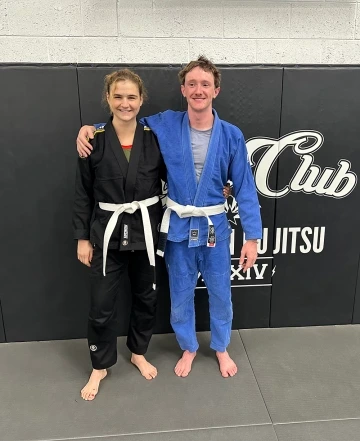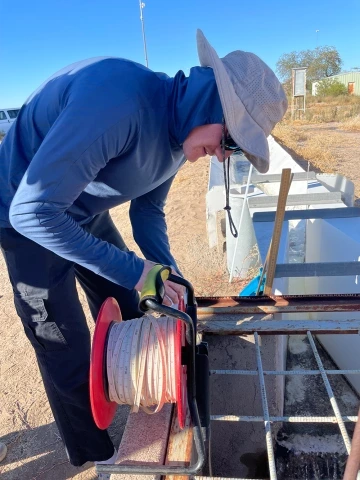Jack Flanigan, HAS AMP Student, Selected Arizona Institute for Resilience Student of the Month

Image: Arizona Environment, Arizona Institute for Resilience
Jack Flanigan is a senior at the University of Arizona studying hydrology with a minor in geoscience enrolled in the accelerated hydrology master's program. In this Q&A, Flanigan shares how his passion for sustainability led him to hydrology, and how he hopes to expand and share water knowledge through research and outreach.
Original content written by Olivia Miltner, Arizona Environment, Arizona Institute for Resilience
How have you been involved in environmental or other activities as a student at the University of Arizona?
I’ve been working with Pima County Flood Control on stormwater harvesting decision-making using modeling and assessing the environmental impacts of the proposed Rosemont Mine with isotope tracers and hydrogeochemistry.

Outside of academics, I love to rollerblade — catch me warming up on campus early weekend nights before rolling downtown for some hoots and hollers from bargoers. I’m also deeply connected to the Hydrology & Atmospheric Sciences community and spend much of my free time at department events like hiking, volleyball, potlucks, and bowling. We have a good time!
How do you hope to incorporate environmental or sustainability values into your future career goals?
I originally started down a career path I was interested in but soon realized it would push me toward exploiting natural resources in a way that didn’t sit right with me. That was a tough realization — especially since I went back to school with sustainability in mind. So, I pivoted to hydrology, where I can build a career that actually aligns with my values.
One of my biggest beliefs is that the environment and its natural beauty belong to everyone. To put that into action, I’m committed to education and community service — making water resources and sustainability knowledge accessible to anyone who wants it.
I’m kicking off this mission through the Hydrology & Atmospheric Sciences Student Association (HASSA), where I’ll be visiting schools around Tucson to teach about groundwater. The more people understand water, the better chance we have of inspiring bright minds to champion sustainability!
Are there any specific aspects of sustainability or the environment that you are particularly passionate about?
Absolutely! There’s so much to be passionate about.

Image: Arizona Environment, Arizona Institute for Resilience
Lately, I’ve been diving into contaminant fate, transport, and remediation — especially in soil and groundwater. Groundwater is an incredibly valuable resource, making up over 90% of the planet’s usable freshwater, and for many of us in Tucson, it’s our main source of drinking water.
Contaminants can seep in and move slowly through aquifers, affecting communities for years. A perfect example is the tetrachloroethylene (TCE) contamination in South Tucson, which harmed many at-risk residents. If it had been caught sooner, lives could have been saved — that’s where fate and transport hydrogeologists step in!
I’ve also been working with Pima County on green infrastructure and stormwater catchment to help increase Tucson’s water resources.
Outside of school, I’m really into sustainable urban horticulture. Cities can be so disconnected from their food sources, but urban gardening brings people closer to what they eat. It’s also a way to push back against the global industrial food system, which damages biodiversity and natural ecosystems.
Growing food locally shifts power away from corporations and factory farms and puts it back in the hands of the people. And it works! If you want proof, just look up “urban horticulture of Havana, Cuba” and prepare to be amazed.
What has your experience looking for professional development opportunities been like, and how have things like internships or student jobs helped you grow?
I’ve had three research positions so far, and each one has taught me so much, not just as a student but as a person. What I love about research is that it takes you from simply learning existing theories to standing at the edge of knowledge itself… and sometimes staring into the abyss. Just kidding! (Mostly.) But really, it’s amazing to see what’s happening at the forefront of your field — it helps you figure out what excites you and what doesn’t.
Professional development opportunities at the university are everywhere. It feels like every week there’s a workshop on LinkedIn, CVs, or personal statements. Plus, we even get free mock interviews, which is pretty awesome!
What is your advice for students looking to find an internship or job, particularly in terms of interviewing for a position?
Definitely take advantage of the mock interviews I mentioned earlier, but honestly, the most important thing is to be confident and authentically yourself.
"What I love about research is that it takes you from simply learning existing theories to standing at the edge of knowledge itself."
- Jack Flanigan, Senior
Take my recent interview with the Central Arizona Project (CAP) as an example — they’re responsible for pumping and delivering Colorado River water to Phoenix and Tucson. Out of hundreds of applicants, they only chose three to interview. No pressure, right...?
So, I walk into the conference room at 1 p.m. sharp, facing four experienced professionals sitting at the other end of a round table, hands folded, looking serious. They start with the classic, “Tell us a little about yourself.” I start to stutter out a few weak words, then it hits me: They picked me for a reason. I know my skills better than anyone.
That realization flipped the whole interview around. Within five minutes, I was in my element — enthusiastic, engaged, even making them cackle with laughter. I was up at the board drawing diagrams, having a blast, and just being myself. So yeah, don’t sweat it. If you’re in the room, it’s because you deserve to be. Own it!
Why should students care about the environment, even if it isn't their major or area of study?
Because it gave us life and continues to do so.

